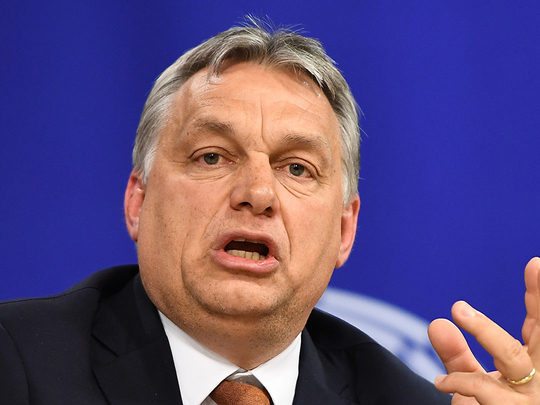
The crowds demonstrating in Hungary in recent weeks have numbered many tens of thousands. They are by no means all students of a university the government is threatening to shut down, but they are mostly young and carry two flags: The Hungarian red-white-green tricolour and the European Union (EU) flag, with its circle of stars. “Europa! Europa!” they chant.
Are they keen to be ruled by faceless bureaucrats in Brussels? Are they determined to have only straight (or curved) bananas? Do they earnestly desire to be occupied by the 80 million Turks of Boris Johnson’s imagination or Nigel Farage’s hordes of Syrian freeloaders? It does not seem likely.
It is not impossible, depending on the result of the French election, that soon there will be no Europa to chant about, that it will break up like a shattered jigsaw with the exit of the United Kingdom, the freefall of Greece and the increasing hostility of the so-called Visegrad group of Hungary, Poland, Slovakia and the Czech Republic — a group of which the Hungarian Prime Minister, Viktor Orban, is the leading light.
Apologists for Orban’s Hungary will tell you it is a perfectly normal country that is constantly being traduced by the liberal Left and undermined by international financiers such as the billionaire philanthropist George Soros. So plutocrats and radicals conspire against defenceless normality.
But normality in Hungary, increasingly since Orban swept to power by a landslide in 2010, means a firm grip on most of the judiciary and on almost all of the media. Receiving a two-thirds parliamentary majority has twice now, though with a smaller share of the vote the second time, enabled him to rewrite the constitution to suit an agenda that looks to establish Hungary as an “illiberal state”, with Russian President Vladimir Putin and Turkish President Recep Tayyip Erdogan as models.
Orban’s political career began in 1989, when as a young man he gave a radical speech at the commemoration service for the dead of the 1956 uprising. He was prime minister between 1998 and 2002, and lost then to what he thought was foul play by his Socialist rival, prompting him to go into full patriotic overdrive. Hungary needed a strong national leader, he thought, and he was going to be it. He is there now and he is going to be all but impossible to shift for a long time. Which is not to say Orban is officially a tyrant. He is simply the autocratic saviour of his democratic nation, which is quite a different thing.
Orban-style democracy means ensuring favourable electoral conditions, establishing control of advertising space, and filling all important boards and committees with cronies from his Fidesz party so they might control finance and appointments. It means passing bills through parliament at the drop of a hat, with minimal scrutiny, including laws expressly devised to close down a university .
It means keeping refugees behind barbed wire or in cargo containers and approving a civil militia to patrol borders. It means regarding the figure of 1,600 refugees requested by the EU as a tide of invaders, and claiming Hungary to be the ethnically homogenous last bastion of Christianity .
In other words, Orbanism is about control, not only of a divided and enfeebled opposition, but of everything awkwardly independent. It’s about trying to starve independent TV and radio stations of income.
Independence to Orban is opposition. A small selection of independent organisations may be preserved for show, on condition they remain ineffectual. The Central European University (CEU) has done nothing in the least oppositional, but it is independent — founded, as it was, back in the 1980s, long before Orban’s Fidesz existed, by Soros, who also established the Open Society Foundation. The combination of Soros and independence, it seems, is beyond the pale and can’t be tolerated.
Soros happens to be Jewish. That, perhaps, doesn’t help. Government propaganda reminds Hungarians that they were just as much victims of the Germans as the Jews, and that Jews have no special privilege to gripe. A controversial public statue showing the German eagle seizing on a Hungarian angel in 1944 embodies that idea.
We can’t officially call Orban’s Hungary a police state. Not yet, anyway. The police are not going to knock on your door and take you away without proper legal procedure, but never fear: Legal procedures will be devised for the purpose. A new law intended to starve foreign-financed NGOs of funds, and targeting the CEU, has just been passed.
Brussels has belatedly started an investigation into the legality of the new Hungarian law, but if the EU is to act in a meaningful way, it should do so before it is too late. Orban endangers the EU as much as Turkey’s Erdogan, the difference being that he is doing so from the inside. Once the independent universities and NGOs are forced out, the field is clear and what is likely to result is a country that will never have been admitted to the EU in the first place, a country unfit for its own young people.
“Europa! Europa!” cry the students, appealing to what, for them, remains a source of hope and of legitimacy. That Europe was never discussed in Brexiting Britain. Its small broken fragments might soon float off to join other larger masses where regimes such as Hungary’s might indeed become normal.
— Guardian News & Media Ltd
George Szirtes is a poet and translator. His collection Reel won the TS Eliot prize in 2004; his latest book is Bad Machine (2013).










